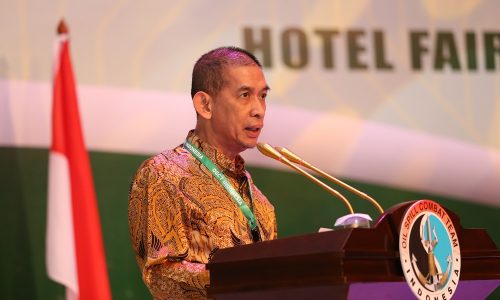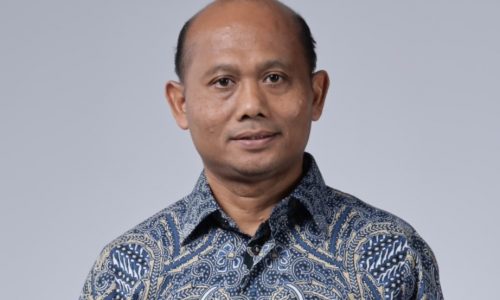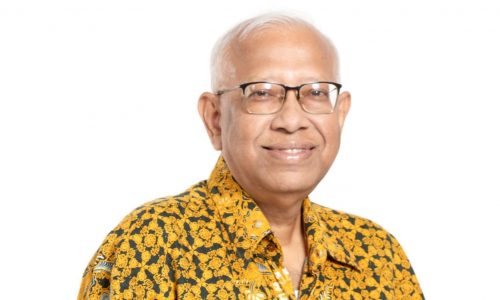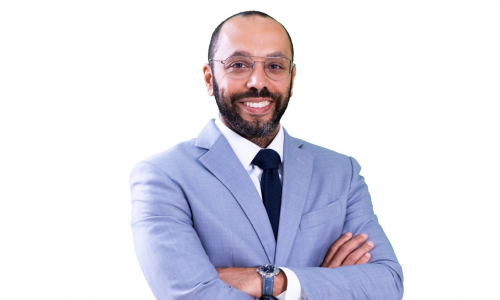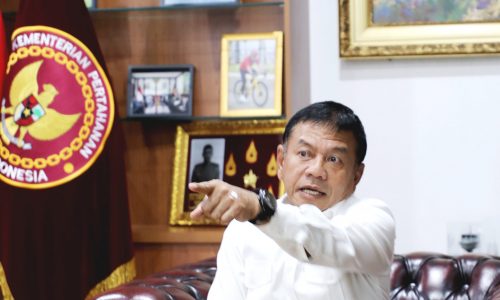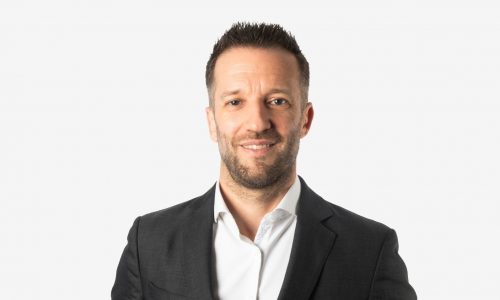François de Maricourt, a key-man in HSBC Indonesia, as a President Director. He is a French national with over two decades of experience in international banking. Through this interview, Maricourt has opened up to Indonesia Business Post on his hopes, ambitions and challenges in life and his perspective in the banking sector giving opportunities within the Indonesian market.
First of all, Could you please tell us about yourself?
I am French. I was born and raised in Paris. I started my career with HSBC France in 1994. Over 20 years ago, in 2001, I seized the opportunity to join the HSBC International Manager program. This initiative offers an ‘expat for life’ option, providing international posting opportunities. Essentially, there is a Global Mobility clause and the bank can relocate me to any country at any given time. Since then, I have gained valuable experience working in numerous countries.
How did you end up in Indonesia?
Previously, I worked in Bangladesh for six years. When the opportunity for a role at HSBC in Indonesia arose, given that the business opportunities and the culture appealed to me, I eagerly applied. In 2020, I was fortunate enough to be selected for this role.
Do you think is it because the Bangladesh market is approximately similar to Indonesia?
No, the Bangladesh market is much smaller than Indonesia. I believe the opportunity arose due to my extensive experience and network in various countries, and we also identified potential for business growth in Indonesia.
Talking about yourself, what has been the proudest moment of your life and career so far?
In my professional life, I find great fulfilment working in developing markets. One particular aspect I truly enjoy is witnessing the impact of our efforts. During my time in Bangladesh, for instance, we financed numerous infrastructure projects, and seeing the positive effects on the country’s development and its people was truly rewarding. Whether it’s the construction of new bridges, the establishment of power plants bringing electricity, or the development of new roads, these tangible outcomes make my work exceptionally fulfilling.
Do you have any other highlights to share?
One of my most marking memories with HSBC was when we financed a satellite in Bangladesh. This was a significant achievement for the country, considering its relatively young age ‒ having just celebrated its 50th anniversary two years ago. Since its foundation in 1971, Bangladesh has faced natural disasters and a low GDP per capita, even earning the label of a ‘basket case’ by Henry Kissinger.
However, over the past two decades, the country has undergone robust economic growth. I believe that being able to join the club of countries launching satellites ‒ there are only around 50 countries in the world that have done so ‒ was an immense source of pride for Bangladesh.
There was even a song about the satellite that was created. I also had the privilege of witnessing the satellite launch at Cape Canaveral on a Falcon rocket. The satellite’s purpose was to enhance Bangladesh’s communication capabilities. The impact of this achievement was profound, evident in the delight reflected in the eyes of many. Considering Bangladesh’s historical struggle with poverty, being part of delivering and financing the satellite launch is a source of lasting pride for me.
Back to Indonesia, what do you like most about this country?
There are so many things to like about Indonesia. The first thing that comes to my mind is the people. There are individuals who are incredibly welcoming and friendly, especially towards ‘orang asing,’ or foreigners. As a foreigner, you may not always be familiar with the history or background of the country, but every time, I encounter people who patiently explain the context and ensure that I avoid any faux pas (slip in manner or conduct). This aspect truly stands out as one of the great points about Indonesia.
The second highlight is the rich culture. Indonesia is a country with a deep and ancient cultural heritage. Living in this country provides a unique opportunity to immerse oneself in and appreciate its diverse cultural expressions. It is truly exciting to explore the roots of so many different cultures wherever you go.
Indonesia also has the potential to be a leading player in the EV (Electric Vehicle) global supply chain with its abundant nickel reserves. Around US$30 billion of foreign investment has already been invested in mining and processed metals over the last few years, with an equal amount expected to be invested. If Indonesia plays its cards well, we can expect Indonesia’s GDP growth rate to rise to 5.8 percent by 2028.
What do you think are Indonesia’s biggest challenges right now?
There are a couple of challenges in Indonesia. While the country holds immense opportunities ‒ which I could talk for hours about them ‒ the reality is that it still faces some challenges as an emerging market. One issue I see is the presence of considerable red tape and regulations that hinder Indonesia from fully realizing its potential. While a 5 percent annual growth rate is commendable, I believe Indonesia has the potential for even more significant growth. Positive developments like the Omnibus Law are promising, and we anticipate and hope for further efforts to simplify regulations, creating a business environment conducive to growth. This, in turn, will not only make Indonesia an even greater place to do business in, but most importantly, allow the country to fully unleash its true potential.
As far as you are concerned, do some of your clients face challenges with regulations in Indonesia?
While the country has performed well in attracting FDI (Foreign Direct Investment), particularly in the mining and battery ecosystems in the past year, historically, Indonesia has not drawn a significant amount of FDI as a percentage of its GDP. Why is that? The answer lies in the numerous rules and regulations. Some investors may prefer to invest in countries like Vietnam over Indonesia.
From a manufacturing perspective, Indonesia is not one of the largest countries. However, there are tremendous opportunities arising from the ‘China+1’ strategy, where many businesses seek to reconfigure their supply chains, diversifying away from heavy reliance on China. Through investments in ASEAN and India, there is a great opportunity for Indonesia to attract more manufacturing opportunities, leading to job creation. Unfortunately, due to the existing red tape and complex regulations that could be streamlined, Indonesia’s share of FDI is not as substantial as it could be.”
And how do you envision Indonesia and its relations with ASEAN by 2030?
Indonesia holds the position of being the largest economy in the ASEAN bloc, contributing more than 35 percent to the total ASEAN economy. As a heavyweight in the region, Indonesia plays a critical role in driving ASEAN towards greater economic integration. What we are seeing is that while ASEAN was originally conceived as a more political construct, it has recently recognized the importance of achieving a more integrated supply chain within the region, requiring increased economic integration.
Currently, Intra-ASEAN trade constitutes only less than 20 percent of the total, which is not very high, with most of the trade happening with China, the US, and Europe. Gradually, what you hope is for ASEAN to develop an integrated supply chain where goods can move seamlessly across countries, with components sourced from different nations, fostering competitiveness for the entire economic bloc. Indonesia, particularly in its role as the chairman of ASEAN, has been instrumental in driving various agendas towards greater integration. There are positive signs of ASEAN moving towards increased integration in various areas.
Initiatives like the digital economy framework recently developed by ASEAN and efforts around transitioning to net-zero also contribute to the region’s development. These endeavours not only enhance Intra-ASEAN business but also align with broader global transitions and developments.
ASEAN has been introducing the Cross-border payment system between ASEAN countries. How do they impact banking transactions, or more broadly, your businesses?
Currently, cross-border transactions are not widespread; they happen in a relatively small amount and are more in a testing phase. The bulk of payments within ASEAN still occur in US dollars and are processed using systems like SWIFT. However, the direction ASEAN is heading towards is a move to a more regional payment system. In the years to come, I anticipate a significant shift in payment dynamics, but this is still in its early stages.
And so, I believe your company is also busy preparing strategies to anticipate that?
Absolutely. HSBC is one of the biggest banks in ASEAN, we have a strong presence in the largest economies within the region. Developing our presence in ASEAN is crucial for us. Naturally, we are closely examining these developments from the payment perspective and exploring ways to support these business initiatives.
What are the main focuses of HSBC in Indonesia right now?
HSBC is the largest international bank in Indonesia, boasting a balance sheet of more than 8 billion US dollars in the country. Our unique business model is based on a universal banking approach, meaning we serve all segments of customers. This includes retail, corporate, Micro, Small and Medium Enterprises (MSMEs), and State-owned Enterprises (BUMN). One of our strengths lies in our connectivity, and we play a pivotal role in facilitating investments and trade with Indonesia. Similarly, we support Indonesian companies looking to invest abroad by assisting them with their expansion plans.
How has the business progress been so far?
The progress has been very good, particularly this year where we have surpassed all our targets. The business environment in Indonesia is favorable, and as a bank, we have made significant strides. Our team’s achievements have led to us being awarded the title of the best international bank by Asia Money. We are quite happy with our performance this year.
What is the next goal or the next steps for your company’s development in Indonesia?
Our plan is to continue growing. As I mentioned, we are observing new opportunities in Indonesia, with the ongoing economic growth and a stable political environment. Additionally, the rapid expansion of the middle class demands more banking services, particularly in areas like wealth management. Our aim is to strategically position ourselves in Indonesia to fully capitalize on these opportunities and cater to these growing segments.
What kind of strategic partners or clients are you searching for, or what kind of partnership collaboration are you seeking right now?
One key priority for us is sustainability and the transition to net zero. Much of our work in Indonesia is focused on this transition. Indonesia has set a target to achieve net-zero emissions by 2060, and HSBC is a member of GFANZ (Glasgow Financial Alliance for Net Zero) and we have signed the Just Energy Transition Partnership (JETP) in November last year with Indonesia.
As part of JETP, we are exploring partnerships between public and private capital to invest in Indonesia and accelerate the transition to net zero. Being a member of JETP, we are actively engaged in various initiatives, such as the energy transition mechanism, in collaboration with the Asian Development Bank.
How do you and your company contribute to the Indonesian market and its people?
What we bring to this market is our expertise in various areas, offering unique capabilities that set us apart from other banks. There are several areas where we excel and can leverage our technological prowess and skill sets. Let me provide a few examples. First, sustainability is a strategic imperative for HSBC, and we are among the strongest banks in this domain. We invest in diverse capabilities to assist our clients in transitioning to net zero and devising comprehensive plans. For instance, we have worked with State-owned cement producer Semen Indonesia Group (SIG) to establish a sustainability framework and facilitate the issuance of a sustainability-linked loan.
Another area of expertise is Equity Capital Markets (ECM), where we aid Indonesian companies in going public and attracting foreign investors. This year, we have supported two significant IPOs ‒ Pertamina Geothermal and Merdeka Battery Materials ‒ bringing our expertise to attract foreign investors interested in these companies. Additionally, we offer expertise in internal finance, cash management, and transaction banking, aligning with HSBC’s agenda. We bring tools used by some of the world’s largest companies into Indonesia, assisting businesses in effectively managing their finances.
I think many international investors are keen to invest in Indonesia. Do you agree?
Absolutely, absolutely. Interestingly, if you are in the US or in Europe, Indonesia is not very well known. So, one of our roles is to be the ambassador of Indonesia and help raise the profile of the country. However, it is safe to say that in the last couple of years, Indonesia is much more on the map, and we have seen a lot of interested investors in Indonesia.
What kind of sectors do they target?
We have various sectors, and one key sector for investments currently is the entire nickel battery ecosystem. For this, we see tens of billions of dollars in investments from different countries worldwide, focusing on the entire downstream industry. It began with nickel mining, and now there are more components for batteries ‒ such as nickel battery precursor and, gradually, cathode ‒ that can be built in Indonesia. Over time, we anticipate the production of complete batteries originating from Indonesia.
Any advice for foreign companies looking to set up in Indonesia?
The advice we offer to any investors in Indonesia is to be patient and persistent. Building relationships is crucial in Indonesia ‒ take the time to talk to people, understand their perspectives. Also, try to share your own perspective; it takes a bit of time to do that. You cannot come here if you just have a transactional approach and you just want to do a deal. So, patience is key, but persistence is equally important. Keep doing your work and investing your time. HSBC, having been in Indonesia for 140 years, has learned the value of patience for success. It is essential to take the time to get to know the people and understand your environment.
If I have $50,000 USD right now, what are five areas where I should invest?
That is a challenging question because there are many different areas in Indonesia where you can invest. I believe the Indonesian stock market hosts several companies that are performing exceptionally well, showing significant growth potential.
From a sector perspective, the digital economy stands out as one of Indonesia’s greatest strengths. The country is quite ahead compared to many markets in ASEAN. Additionally, you have the health and pharmaceutical industry in Indonesia that is thriving rapidly, presenting vast opportunities. As earlier mentioned as well, the mining sector, especially the entire nickel ecosystem, is noteworthy. Lastly, Indonesia’s substantial domestic market makes the entire Fast-Moving Consumer Goods (FMCG) sector a great opportunity, given the expected growth of the middle class, bringing additional opportunities to the domestic market.
What is one thing that you could keep talking about for hours?
Transition to net zero. I believe this is one of the biggest challenges that we face, and there are still many solutions in progress. We see a significant amount of investment flowing in, and as a bank, we have a catalytic role to play in attracting investments to fund these projects. That is why HSBC is a member of JETP and is genuinely committed to supporting the transition to net zero in countries like Indonesia.
Apart from business discussions, what kind of subjects you could keep talking about for hours?
I am also quite interested in literature, and I enjoy reading, so I like to share what I am currently reading.
Okay, and what are you reading right now?
So, I have just finished a book by my favorite author, Haruki Murakami. He is a Japanese author, and I am still wondering why he has not received the Nobel Prize for literature.
Which one of his books?
Kafka on the shore.
What qualities do you most admire in a person?
There are many qualities in a person that I can think of, but I think some of the qualities I really admire include empathy, the ability to connect with others, and humility. Those are some very important qualities.
If you could have dinner with 3 people living or deceased, who would they be?
There are so many people. I would say Mother Teresa. I think what she has done to support the underprivileged population in Calcutta, India, is truly amazing, and I would love to have the chance to meet her. Another would be Murakami, as I mentioned he is my favourite author. I am a huge fan and would love the opportunity to meet him and have a meaningful discussion with him. The third one I can think of is Leonardo Da Vinci. It is amazing how someone like him has a breadth of knowledge and is simultaneously an artist, mathematician, and involved in so many fields. He is very impressive, and I am sure having dinner with him would not be boring at all. So many things to discuss with him.
What is art for you? What kind of art do you find most interesting?
I think it is not easy to define art. For me, art is something that inspires a kind of aesthetic feeling, which is not logical or rational; it is more about feelings and emotion. Art is something that truly brings people an experience of artistic emotions, triggers artistic emotions. For me, that is what art is. As for the kind of art I find most interesting, I enjoy various forms of art. Reading, as I mentioned, is very interesting. Another one is classical music. I am quite a big fan of classical music, and another form of art that I also quite enjoy in Indonesia is painting.
What kind of painting, can you specify?
Contemporary.
As for the last question, do you believe in destiny?
I would say I believe more in luck than destiny. So, I think at times you would question what luck is, being in the right place at the right time, but at the same time, you create your own luck and shape the environment around you that will create this luck. So, my answer is yes and no.



